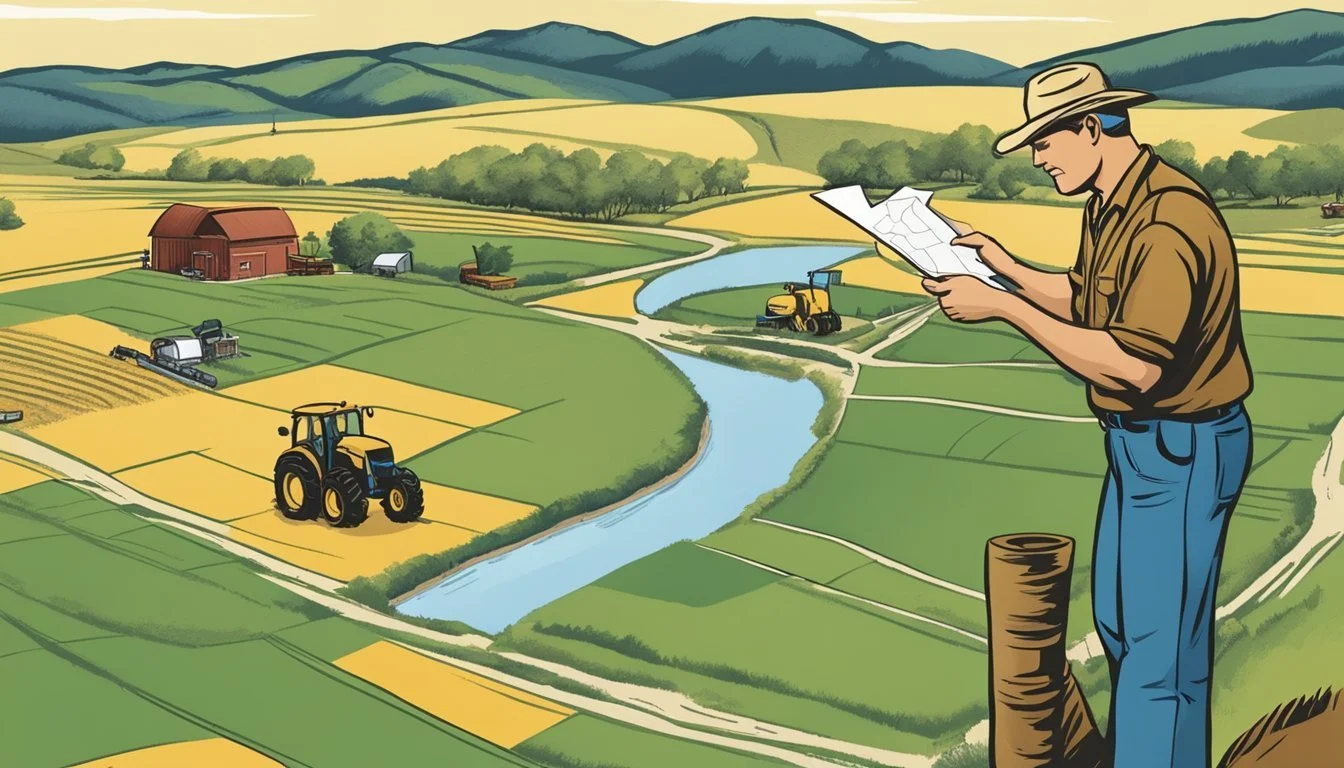Farm Loans in South Dakota
Navigating Financial Solutions for Farmers
This Article is Part of Our Guide on Farm Loans for All 50 U.S. States
South Dakota's economy has strong roots in agriculture, with a significant portion of its income generated from farming and ranching activities. Given this agricultural prominence, farm loans are an essential component for farmers and ranchers looking to finance their operations, purchase land, or make improvements to their property. These loans cater to various needs, from acquiring new acreage to upgrading existing facilities, ensuring that the state's agricultural sector continues to thrive.
The availability of farm loans in South Dakota is facilitated by a combination of private financial institutions and government programs designed to support the agricultural community. Among these resources, programs like the USDA Farm Service Agency offer a range of loans, including farm ownership loans, specifically tailored for beginning farmers to assist with down payments on real estate. These programs aim to bolster the financial capabilities of farmers and ranchers, thus contributing to the economic sustainability of rural communities in South Dakota.
Agricultural loans in the state come with varying terms and benefits, such as flexible repayment options and the absence of prepayment penalties, making them adaptable to the diverse and dynamic needs of South Dakota's farming industry. This accessibility to financing empowers new and established farmers and ranchers to not only maintain but also grow their businesses, securing the state's agricultural future.
Understanding Farm Loans
Farm loans in South Dakota provide essential financial assistance to farmers and ranchers, enabling them to manage their agricultural enterprises more effectively.
Types of Farm Loans
Operating Loans: Designed to cover the day-to-day operating expenses of running a farm, such as buying seed, fuel, and fertilizers.
Farm Ownership Loans: Offered to assist with the purchase of land, livestock, equipment, and improvements.
Beginning Farmer Loans: Tailored to support new entrants in farming with lower capital requirements.
Conservation Loans: Aimed at helping farmers implement conservation and environmental enhancements on their land.
Eligibility Criteria
General Requirements include:
Qualification as a farmer or rancher, with substantial involvement in agricultural production.
Satisfactory credit history demonstrating the ability to repay the loan.
Legal capacity to accept responsibility for the loan obligation.
Specific Criteria vary by loan type:
Operating Loans: Adequate managerial experience in farming.
Farm Ownership Loans: Must be the owner-operator of a farm.
Beginning Farmer Loans: Limited experience and capital necessary, but must demonstrate potential for success.
Conservation Loans: Must have a conservation plan approved by the Natural Resources Conservation Service.
Loan Application Process
Step 1: Contact a loan officer to discuss loan options and requirements.
Step 2: Complete an application form, providing details about financial status, collateral, and the farming operation.
Step 3: Undergo a credit check and assessment to review qualifications and potential risks.
Step 4: If approved, work with the loan officer to finalize terms and sign agreements.
Documentation Needed:
Financial statements
Proof of insurance
A business plan or farming operation plan.
Simplified for brevity and compliance with guidelines.
Key Financial Resources
In South Dakota, agricultural producers have several financial resources at their disposal, particularly through federal and state programs designed to support farm ownership, conservation efforts, and operational expenses.
USDA Farm Loans
The United States Department of Agriculture (USDA) offers various loan programs tailored for farmers and agricultural producers. Notably, the USDA's Farm Loan programs provide significant opportunities for procuring financial assistance. These loans cater to a range of needs from the purchase of land to the improvement of existing farm facilities.
Direct Farm Ownership Loans: Facilitate the purchase of farmland.
Operating Loans: Offer capital to manage day-to-day operations.
Microloans: Provide smaller amounts of funding for start-up or operational needs.
Farm Service Agency (FSA) Programs
The Farm Service Agency (FSA), an agency of the USDA, administers several key programs aimed at assisting beginning farmers and established producers.
Beginning Farmer Down Payment Loans: Assist new farmers to finance land purchases.
Conservation Reserve Program (CRP): Offers payments for land removed from agricultural production and planted with species that improve environmental health.
State Agricultural Lending Agents
Local entities in South Dakota offer lending services supported by the knowledge of the state's agricultural landscape. One such entity, FarmLend, operates with backing from Farm Credit Services of America. FarmLend emphasizes:
Quick and Simple Land Loans: Streamlined lending service for buying land.
Local Presence: Presence in significant South Dakota cities for localized assistance.
Beyond FarmLend, the South Dakota Department of Agriculture also reminds stakeholders of available financial assistance, which helps maintain the state's robust agriculture sector. They offer low-interest rate options beneficial for various agricultural initiatives.
Loan Types for Specific Needs
Farmers in South Dakota have access to a variety of loan types tailored to meet specific operational needs, from purchasing livestock and equipment to acquiring land.
Operating Loans
Operating Loans are designed to support the day-to-day needs of a farm operation. They are essential for farmers who require capital to cover costs such as seeds, fertilizers, and labor. In South Dakota, these loans offer a financial cushion, which can be crucial for maintaining cash flow through the growing and harvesting seasons. For instance, a farm operating line of credit provides flexible funding to manage operating expenses fluidly.
Equipment and Livestock Loans
Farmers need the right tools and animals to stay productive. Equipment and Livestock Loans are specially structured for these purposes. They allow farmers to purchase, replace, or repair machinery vital for planting, harvesting, and managing crops. Similarly, these loans can be used to buy livestock, which is an integral part of ranch operations in South Dakota. The timely acquisition of equipment and healthy livestock can make or break a farm's success in the competitive agricultural market.
Real Estate and Land Loans
Acquiring and developing agricultural property is a major step for farmers. Real Estate and Land Loans serve this segment by providing the capital for purchasing farm real estate, including land. In South Dakota, land loans are available for both full-time and part-time farmers, ensuring that a variety of agricultural needs are met, from expanding arable land to investing in sustainable farm infrastructure. These loans often have terms favorable to long-term investment, reflecting the significant commitment of acquiring farmland.
Managing Farm Finances
In South Dakota, effective management of farm finances is critical for maintaining sustainability and growth. Farmers and ranchers are tasked with navigating fluctuating markets, adhering to financial standards, and securing sufficient financing while ensuring profitability and equity growth.
Budgeting and Cash Flow
Budgeting serves as the foundational strategy for farmers to plan annual financial activities, anticipate revenues, and allocate funds for expenses. It's essential to maintain a positive cash flow to manage day-to-day operations and make timely payments.
Projected Cash Flow: Estimations based on historical data and market trends.
Actual Cash Flow: Real-time tracking of income and expenditures.
Navigating Financial Challenges
Economic variables like commodity prices and inflation can lead to financial challenges. Farmers must remain vigilant about their bottom line, actively seeking ways to reduce costs and increase efficiency. Effective strategies might include:
Refinancing agricultural loans at lower interest rates
Restructuring debt to prevent delinquency
Leveraging equity in their farming operation for additional liquidity
Insurance and Disaster Assistance
The Inflation Reduction Act has provisions that may affect farm operations, including opportunities for tax credits and grants. Crop insurance and disaster assistance programs are pivotal in safeguarding farmers against losses due to natural disasters or unexpected market shifts.
Eligibility criteria for different insurance programs and how they impact financial resilience
Processes for applying for USDA disaster assistance programs during adverse events
Special Considerations in South Dakota
South Dakota's agricultural sector is influenced by its local economy and prevalent agricultural trends. Understanding these factors is essential for farmers considering loan options and land purchases.
Impact of Local Economy on Agriculture
South Dakota's local economy significantly relies on agricultural outputs such as wheat and corn, both of which are substantial contributors to the state's gross domestic product. Rent and land prices in areas like Pierre, Sioux Falls, and Rapid City can affect the financial considerations of farmers in these regions. The cost of seed and feed also plays a critical role in operational expenses. South Dakota agricultural lending agents, aware of these local economic conditions, offer competitive rates for farm loans.
Agricultural Trends in South Dakota
In response to agricultural trends, South Dakota farmers adjust their planting strategies and resource allocation. David Koupal, Justine Rivard, and Justin Lester, renowned lending agents in the area, might suggest extraordinary measures for distressed borrowers. They have insight into market demands and can offer advice on the best crops to plant and the timing of market entries.
South Dakota Farm Loans: Tailored to support the purchase of farm land, inputs like seeds and equipment, and other necessities.
Competitive Rates: Lenders in South Dakota provide rates based on a thorough understanding of the agriculture sector's trends and challenges.
Support for Farmers: Services range from guidance on proper land management to financial planning, especially for distressed borrowers.
Farmers in South Dakota can access a range of farm loans that are designed to meet their specific needs. Whether in urban centers like Sioux Falls or rural areas around Huron, agricultural loans are a vital support mechanism, and free resources are available to help navigate the nuances of farm lending.







